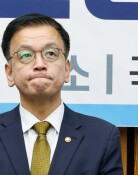Administration Nixes Calls for Liquidity Exit Strategy
Administration Nixes Calls for Liquidity Exit Strategy
Posted July. 25, 2009 08:05,
The presidential office yesterday said it will not adopt an exit strategy aimed at absorbing excess liquidity in the market this year.
Plans to cut corporate and income taxes will be implemented next year as originally planned, a high-ranking presidential official said.
Certain politicians and scholars are urging us to consider an exit strategy, but its too early to do so, he told The Dong-A Ilbo in a phone interview. The Strategy and Finance Ministry has the same idea.
Major advanced economies agree on the need to maintain expansionary policies of economic stimulus for the time being and officials of the International Monetary Fund have advised us to keep our policy direction.
Controversy in and outside of the government over the proposed exit strategy is expected to die with his comments. Extraction of liquidity from the market through reduction in state spending and interest rate hikes is also expected to be carried out on a limited level.
The Korea Development Institute also requested an exit strategy. Think tanks can make such a request. From the perspective of those who devise and implement policies, however, the time is not right, the official said.
The presidential office is known to oppose an exit strategy because full-fledged economic recovery has yet to come. It expects private investment to inject momentum into fledgling recovery in the second half of the year.
Kang Man-soo, chairman of the Presidential Committee on National Competitiveness, said, The government has sustained economic recovery thanks to state spending and a weak won in the first half, but such effects will no longer be available in the second half.
The only way to shore up economic growth in the latter half is boosting private investment. Therefore, stimulus policies should continue.
On the proposed delay to income and corporate tax cuts to secure fiscal soundness, the administration will stick to its original plan to maintain policy consistency and encourage investment.
It also reviewed a plan to raise the debt-to-income ratio to stabilize the property market, but decided on a cautious approach for fear of a negative effect on the overall economy.
koh@donga.com cha@donga.com







